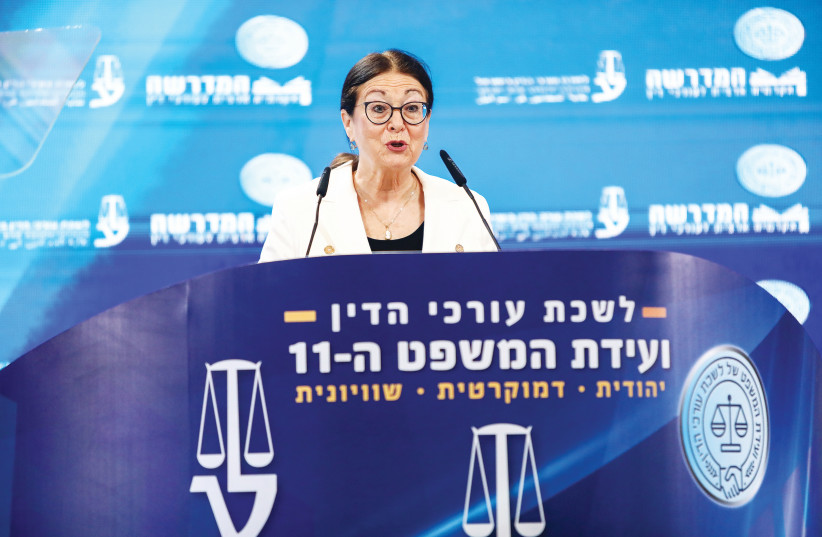One of the greatest changes to the Judicial Selection Committee that overhaul legislation would bring is the removal of Israel Bar Association representatives from the panel.
Sara Haviv, a lawyer and retired judge, explained that until now, the composition of the selection committee included the justice minister and another cabinet minister, the Supreme Court president and two other justices, two members of Knesset, and two IBA representatives.
“It is a committee that is considered, or has been considered until now, to be relatively balanced,” said Haviv.
A balanced committee
The current system and the changes to the committee must be understood in the “context of our democratic system. We have a system of inherent checks and balances on the authority of the government,” she said. Unlike the US or UK which have a bicameral legislature or a constitution, the court has been the only check on government excess.
The updated panel would replace the two IBA representatives with the Constitution, Law and Justice Committee chairman and another minister, and two public representatives of the justice minister’s choosing.

This, along with other factors such as requiring the judge on the panel to be retired and chosen in agreement with the justice minister, would create a condition in which the ruling coalition would gain an automatic majority, according to Haviv.
“Now the committee is fully political,” the former judge said. “I mean that absolutely, the coalition – the government – will have full control. The head of the committee will have full control over judges who will be appointed, over the promotion of judges who are already in office, and certainly in the High Court.”
The loss of the bar members doesn’t just change the political nature of the committee, but as Haviv explained, it also changes the professionalism of the panel.
The bar members “are essentially customers of the court. They come to the court every day and present different sides of the law, and therefore they are able to appreciate the professionalism and ability of the judges.”
These lawyers are able to see a side of the judges that isn’t necessarily appreciated by other judges. While judges may be able to present themselves well on paper and in front of other judges, their actual conduct is known by the Bar Association, of whom all Israeli lawyers are members.
Unlike many politicians, IBA members also have qualified professional opinions that can help choose the right candidates, by merit “of temperament, and also for the matter of efficiency, the matter of patience, and proficiency in relevant subjects,” Haviv explained.
The court has the power to strike down legislation
Yonatan Green, who wrote the paper “Association of lawyers in Israel – analysis and proposal for reform” for the Kohelet Forum, says that while in some systems it makes sense to have a professional association like the IBA help select judges, that is not the case in a system like Israel’s where the court has the power to strike down legislation.
Such judges need to be chosen by keeping in mind political priorities, policy preferences and biases, as there are many judicial powers, such as the “reasonableness” clause, that cross the threshold of professional judgment into the realm of political power.
According to Green, it is a global norm for judges with political power to be appointed under a political rationale rather than a professional one.
“When that happens, the rationale for the people who are making that appointment becomes a democratic rationale,” said Green. “The idea is: Do these people represent the public, do these people represent democratic authorities? And that’s where the problem comes in with the professional association’s involvement in the selection process.
“The bar cannot be seen as representatives of the public,” he said, and can hardly be seen to be representatives of all lawyers, who are required to be members of the association to practice.
Green expressed concern about the symbiotic relationship between the IBA and the judiciary. There are many vested reasons for lawyers to cooperate with the bar in order to seek judgeships, and similarly, it has an interest in forming a bloc on the committee to vote together for judges.
This is not to say that lawyers should be excluded from the selection process, the paper’s author said. The legal community can be involved in another way, such as through a mandatory consulting process, an observer status or other types of advisory function.
“We certainly want to hear the practicing legal community’s position on any particular candidate,” said Green. “And it’s very valuable to know what practicing lawyers think of a particular candidate: whether they are good judges or not good judges.”
